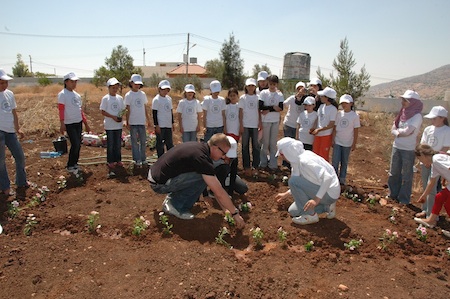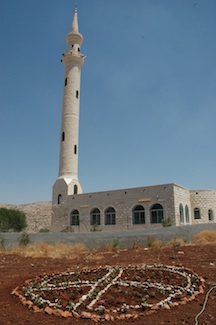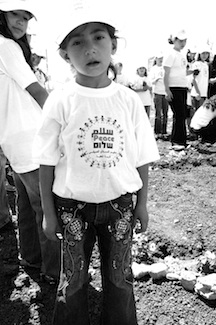
Volume [7]
No. [1]
June 2010
 |
||
|
Volume [7]
|
No. [1]
|
June 2010
|
The Village of Al-Aqaba: Resistance Through Survival
|
|
While volunteering with ISM in the West Bank in the summer of 2009, I visited the village of Al-Aqaba in the northern part of the Jordan Valley, next to the town of Tubas. The area has fertile land and a plentiful underground water aquifer. Israel would like to confiscate these resources, and has built three military bases around the village. Village residents and nearby Bedouins are now confined to less than 0.1 percent of their original lands. Israel implements these land confiscation and exploitation policies through zoning and planning laws forced upon the residents. The Israeli occupation government has issued 39 demolition orders in the village; no construction is ever approved. These policies are intended to destroy yet another Palestinian village, forcing its residents to join the approximately 6 million Palestinians who have been driven from their lands and homes.  Ryan and children planting a peace sign garden at Al-Aqaba. The dispossession began in 1967, when the Israeli Army began to use the village and surrounding lands for training exercises. In 1970 three military bases were built around Al-Aqaba, and a fourth was sporadically utilized. Much of the village land was confiscated at that time, and the entire area was declared a closed military zone. These actions largely put an end to agricultural production, the rearing of livestock, and public services such as health care and education. Israeli Occupation Forces (IOF) also began to raid homes and conduct training exercises, using live ammunition. Mines were placed in the village fields and soldiers began to harass the villagers. To date, these practices have resulted in the death of eight and the maiming of more than fifty residents. Haj Sami Saadi is the mayor of Al-Aqaba. In 1972, when he was 16, he was shot three times in the back by Israeli forces while working in his family's fields. He was left paraplegic and confined to a wheelchair ever since. 700 of the village's 1000 residents fled in search of a safer place to live. Later, during the Oslo peace process, Haj Sami dreamed that peace might finally come to his village. These dreams ended in 1999 when the IOF destroyed a newly installed electrical and telephone infrastructure. Appeals to Israeli authorities brought re-installation of the connections. Next, they lost the ability to irrigate their fields when an IOF bulldozer, without warning or cause, filled in the village's small agricultural reservoir. The first seven home demolitions occurred in 1999, leaving the owners homeless. No compensation, redress, food, shelter or support of any kind was offered to these families as they struggled to rebuild their lives and feed their children. Dreams of peace gave way to a new period of tragedy and hardship.  Unique minaret with a double peak representing a peace sign. |
In 2002, as a result of a village petition to the Israeli High Court of Justice, a decision was issued that removed one of the three military bases surrounding the village, and the IOF was ordered to stop using the village for training exercises. With this court ruling, the residents hoped to resume normal, dignified lives. They built a kindergarten and women’s center to encourage displaced families to return. 130 children and mothers used the facilities. In 2004, Israeli Army Civil Administration issued orders that would effectively raze the entire village. The demolition orders included the mosque, medical center, kindergarten, and most of the homes in the village. In June 2006 an American serving in the IOF opened fire in the village mosque. He fired 106 bullets before taking his own life. Fortunately, no residents were harmed. In 2007, the Israeli High Court of Justice heard an appeal from the village to revoke the military order calling for demolition of the village. Instead, the Court validated the order, authorizing confiscation of 80% of the remaining village land and the demolition of any structure. Al-Aqaba has no history of extremism or armed resistance. It is a simple, isolated village. The people have never given Israel any reason to attack them or destroy their lives. The father of one family with 12 sons asked a soldier, “Where am I suppose to take my family? And what do you think my son’s attitude to Israel will be when they grow up? Is this going to bring peace?” The day I visited the village, I was cheerfully greeted by mayor Haj Sami and a group of children who were attending a summer camp that the village was hosting. First, I helped the children plant a flower garden in the shape of a peace sign. Next, they gave me a tour of the school, hospital, and women’s center. Their kindness, pride, and hospitality made it unfathomable that anyone would want to destroy such a place.  A camper with a T-shirt that says 'peace' in English, Arabic and Hebrew Several years ago an Israeli Army jeep crashed outside Al-Aqaba. The villagers rescued and saved the lives of the soldiers who have caused them so much pain. Three days later the army delivered a demolition order for the village’s health clinic. The village faces many hardships and unimaginable oppression, yet the people still remain peaceful, deplore violence, and demand justice. Israeli violence and aggression is met with calls for peace and acts of kindness. Yet, Israeli consistently meets their non-violent resistance with violence, disrespect for basic human rights and destruction. Many international volunteers go to Bil’in, Jerusalem and Gaza, where civil disobedience and demonstrations get attention and are important. However, there are many places like Al-Aqaba that simply refuse to flee or give up in the face of terror. This form of resistance is also a form of steadfastness against injustice, and no less heroic. Ryan Fay is completing his law degree at Golden Gate University, after which he will attend the LLM program for Public International Law at Amsterdam School of Law. During his most recent trip to Palestine, he interned at the Jerusalem Legal Aid and Human Rights Center, and volunteered with ISM. |